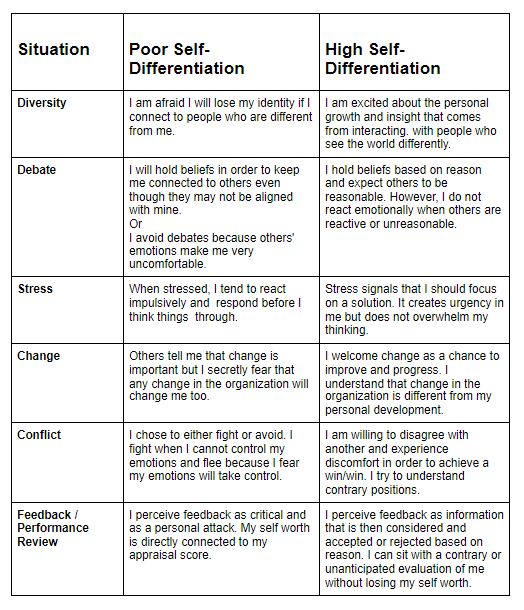In the hope of figuring out how to treat families, one of the most innovative and iconoclastic psychologists, Murray Bowen, discovered the core of a leader a decade before anyone mentioned emotional intelligence. As technology has given us greater access to how the brain functions, scientists have found even more support for this theory.
In this article, we will define differentiation of self, the theory that provides context for most leadership behaviors. Bowen and those who further elaborated on this concept (e.g. Edwin Friedman) believed that leaders with high self-differentiation will naturally behave effectively and that working on improving differentiation of self is more important than learning leadership techniques.
The Theory of Differentiation of Self
According to Bowen, differentiation of self represents the degree to which individuals are able to balance two areas: rational with emotional functioning, and independence with closeness. When these two areas are balanced, individuals achieve a high level of self-differentiation and are capable of distinguishing their thoughts from feelings and intimacy from autonomy.
Although the formula seems simple, Bowen’s personal experience and his research indicated that it takes about three years to achieve a high level of self-differentiation. Therefore it takes a significant commitment to growth from anyone in a leadership position who wants to improve.
Leaders experience relationships with their teams, peers, and other organizational leaders in three ways:
- Balanced: This leader maintains engagement with the team without losing self. This is the optimal relationship and the position of greatest influence and impact.
- Fused: This leader loses some self in the interactions with the organization but is highly emotionally engaged. They are more likely to change their opinions to align with the beliefs of others than in response to a rational argument. They are reactive when their relationships are stressed and fear losing connections. However, others tend to feel an emotional bond with them.
- Cutoff: This leader tends to maintain their opinions and ideas despite pressure to think otherwise but struggle to inspire others to follow their ideas and plans. They often fail to understand the emotional reactions of others. When disagreeing with another, they will avoid any meaningful interactions.
Further research revealed four key characteristics that relate to highly differentiated leadership. Those with high differentiation of self possess the following:
- The ability to maintain the I-position, wherein they retain a well-defined sense of self and have the capacity to hold onto personal convictions despite pressure to think otherwise.
- Less Emotional Reactivity. They respond to crises and conflicts with an emotionally controlled urgency in combination with well thought-through solutions.
- Less Emotional Cut Off and disengagement. They are willing to engage in uncomfortable conversations and interpersonal challenges to maintain relationships.
- Less Emotional Fusion. They are less affected by the moods and whims of those around them.
To put differentiation of self in context, here are a few situations where leaders’ self-differentiation is revealed.

The Point
True leadership does not reside within individual leaders but manifests in their relationships with others. As a result, differentiation of self can only be understood and evaluated in a relational context. The most important indicator of self-differentiated leadership is the degree of toxicity within the organizations or teams they lead. The longer a poor self-differentiated leader is in charge, the more the toxicity in the organization will grow.
Very poorly differentiated leaders rarely seek help on their own. They only work with a coach when it is mandated by others. Others with more self-awareness (a feature of higher self-differentiation) understand the need to improve their self-differentiation and seek out an effective coach. Despite the need for effective coaches, finding one who can build a leader’s self-differentiation is hard. The best ones tend to have a solid background in psychology and a clear understanding of business organizations.
If you are ready to consider making the commitment to becoming the best possible leader you can be, reach out to Psynet Group for a free 30-minute conversation.
